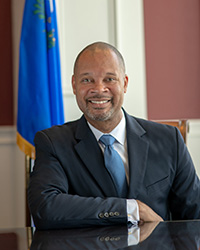Hands on the Present, Eyes Toward the Future
Achieving meaningful social and criminal justice reform requires lots of talk—and even more action

By Nevada Attorney General Aaron Ford
My path to becoming your attorney general has been a long one, paved with many challenges. My family didn’t have much when I was growing up—we couldn’t even afford my college application fee. But with a lot of family support and help from the federally funded Upward Bound program, I managed not only to attend college, but to earn five degrees (including a JD from The Ohio State University). I also have served this wonderful state in two substantial capacities: first as a member of the Nevada State Senate, and now as your attorney general.
All of my experiences—person, educational, and professional—prepared me for the responsibilities I face today. And those responsibilities are as significant as they are vast.
It’s no secret our communities are confronting a variety of challenges, many of which flow through the criminal justice system. Just one problem with that approach: Punishing the outcome doesn’t address or solve the underlying problem. Criminalizing a large portion of the population often results in collateral consequences, and those effects often produce and perpetuate unnecessary roadblocks for nonviolent offenders and recovering addicts who might otherwise live more productively through stable employment, home ownership, and community and family engagement.
While retribution is one of the purposes of the criminal justice system, so is rehabilitation, which includes creating opportunities for individuals to focus on re-entry into their communities. In pursuit of that objective, I’ve been a member of the Advisory Commission for the Administration of Justice since I was a state senator. The commission drafted a report that identified key considerations as we continue tirelessly fighting for justice in Nevada. For instance, our state’s prison population has grown seven percent since 2009, and the number of people with an identified mental health need who have been imprisoned has increased 35 percent since 2008.
In response to this disturbing criminal justice data, I have been working to implement the changes mandated in 2019 by Nevada Assembly Bill 236. Policies I’ve enacted include court recommendations against pretrial practices that have a disparate impact on low-income individuals. We also have promoted alternatives to incarceration to limit the aforementioned collateral consequences while addressing public safety. These alternatives can include house arrest, added supervision through diversion, and other specialty court programs. We also have instituted policies and training to combat implicit biases in decision-making to guard against disparate treatment of various groups of people.
Of course, any discussions about meaningful criminal justice reform in Nevada must include a commitment to improve mental health resources. Lack of affordable mental health services is a crisis in the Silver State, where several counties lack even a single licensed psychiatrist. In those communities, individuals who require a psychiatric evaluation to determine if they’re a danger to themselves or others must be transported—sometimes hundreds of miles—to another community that has a psychiatrist.
Make no mistake: Accessibility to health services and mental health treatment makes all Nevada communities safer. There is no justice without human dignity, fairness, and equity. That is why incarceration should not be our first step in addressing mental health issues.
Running concurrently with the need for modifications to our criminal justice system has been the call for social justice reform. As all of us have witnessed through the many ongoing protests across our country, Americans not only are taking notice of institutional injustices, but they’re demanding change. Now is the time to have these difficult conversations about a number of critical topics, including: the roles of law enforcement in our communities; overincarceration; use-of-force responses; and criminalizing homelessness. These conversations (among many others) are vital if we are to ever achieve substantial and overarching criminal justice reform.
The day I took the oath of office as your attorney general in 2019 is burned into my memory. It was with intense conviction that I raised my right hand, placed my left on my father-in-law’s Bible, and made a commitment to myself and to every Nevada citizen to serve and protect this great state. In that moment, I was fully cognizant that each of my decisions has the potential to impact all Nevadans. Such is the way I lead: with my hands on the present and my eyes toward the future.
Without question, 2020 has been a difficult year for everyone, and we’ve all struggled in different ways. That’s why it’s important that we, as compassionate humans, must acknowledge those who might be suffering and also recognize our role in our local and global communities.
Remember: We all have a part to play in bringing about change. When we stand tall and stand together, our communities become stronger.